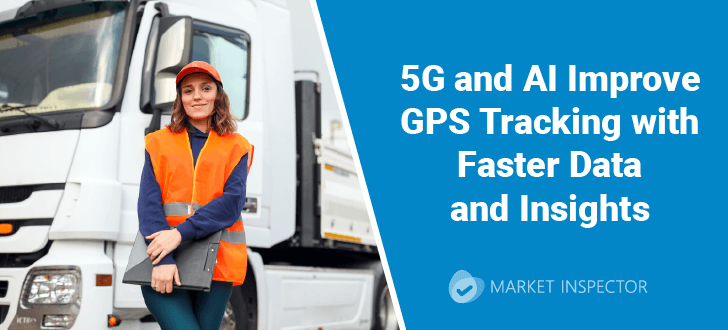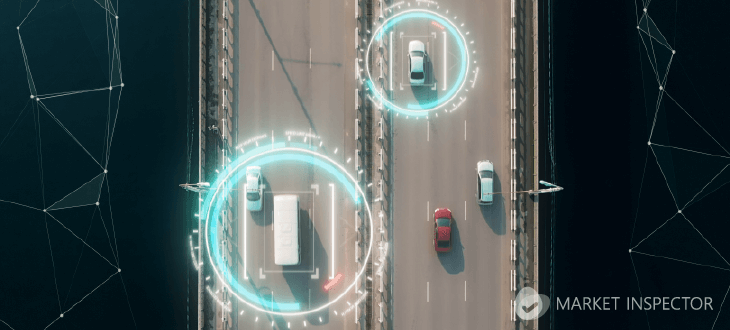Answer these simple questions and we will find you the BEST prices
Which type of solar quotes do you need?
It only takes 30 seconds
100% free with no obligation

Get up to 4 quotes from our selected suppliers by filling in only 1 form

Save money by comparing quotes and choosing the most competitive offer

Our service is 100% free and with no obligation
- Market-Inspector.co.uk
- Vehicle Tracking
- Best vehicle tracker
Which Vehicle Tracker Is The Best For Your Business?


- Vehicle tracking continues to evolve into a critical tool for managing fleets.
- When choosing a GPS vehicle tracking system, businesses should identify key operational challenges, such as reducing fuel costs or improving safety protocols.
- Emerging technologies like 5G and AI enhance GPS vehicle tracking by enabling faster data transmission and predictive insights for better fleet management.
According to the GPS Vehicle Tracking: A Start-Up Guide for Your Business by Bobit Fleet Group, GPS vehicle tracking technology has significantly evolved from its inception as a basic locator to a comprehensive tool that addresses complex business challenges. Today, it enhances safety, optimises workflows, and improves fleet management.
The Business Research Company’s Vehicle Tracking Systems Global Market Report 2024 highlights that advancements in connectivity and data analytics are shaping the future of GPS vehicle tracking.
The introduction of 5G technology, for instance, enhances system capabilities through faster data transmission, allowing for real-time updates and precise tracking. Moreover, integrating AI and machine learning can provide predictive insights into vehicle maintenance and driver behaviours, optimising fleet management.
- Describe your needs
- Get free quotes
- Choose the best offer
It only takes 30 seconds

Do different vehicles require different GPS trackers?

The choice of vehicle tracker largely depends on the type of vehicle and its specific needs. Different vehicles have unique requirements that influence the selection of GPS trackers:
- Commercial trucks and lorries: Require robust systems that can handle long hauls and harsh conditions. Features like long battery life and advanced diagnostics are crucial.
- Delivery vans Often benefit from trackers that offer real-time location data and efficient route mapping to ensure timely deliveries.
- Company cars: When considering car tracker installation, remember that more discreet trackers may be needed to monitor vehicle usage and driver behaviour without being invasive.
- Specialised vehicles (for example, construction machinery): Strong, weather-resistant trackers with geo-fencing are needed to monitor movement within designated operational zones.
Each vehicle type might benefit from a different tracker, emphasising the importance of selecting the right device to meet specific operational needs.
How does tracking a vehicle with GPS work?
GPS vehicle tracking systems utilise a network of satellites to pinpoint a vehicle's exact location. Each tracker contains a GPS receiver that captures signals from these satellites, determining the vehicle's current position based on the time it takes for the signals to reach the receiver.
This process, known as trilateration, involves at least four satellites calculating the vehicle's position, speed, and direction of the vehicle.
GPS trackers are invaluable for their real-time tracking capabilities. Business owners particularly benefit from features like:
- Live tracking: Allows for the real-time monitoring of vehicle locations, which is crucial for dispatching and managing fleet movements.
- Route history provides historical data on vehicle routes, helping to optimise paths and improve fuel efficiency.
- Geo-fencing: Enables businesses to set up virtual boundaries around specific locations for enhanced security and operational control.
- Alerts: Instant notifications for important events such as unauthorised vehicle use or deviations from planned routes.
By integrating GPS trackers, businesses can enhance operational efficiency, reduce costs, and improve security. The right GPS tracking solution not only helps in asset management but also provides critical data that can drive strategic business decisions.
Verizon Connect’s whitepaper on Cutting Fleet Costs: 5 ways fleet management technology emphasises the importance of GPS tracking devices as they are beneficial for cutting labour and accident costs.
The whitepaper states that fleet managers can monitor the precise locations of their vehicles with car trackers and vehicle tracking devices. This ensures that labour costs reflect actual hours worked and helps reduce unnecessary overtime expenses. This efficient management tool is crucial for optimising workforce operations.
Furthermore, implementing GPS trackers with AI dashcams and driver scorecards promotes safer driving practices and significantly reduces accident-related costs. These devices help lower the incidence of accidents, thus decreasing expenses related to damages and insurance claims.
Additionally, selecting the best car tracker for insurance can significantly save your premiums. Insurers often offer discounts for businesses that utilise reliable tracking systems, as they help reduce the risk of theft and improve vehicle recovery rates.
Finding a cheap car tracker that still offers essential features is possible for those on a budget. Affordable options provide basic tracking capabilities without compromising on quality or reliability.
What types of vehicle tracking devices are there?

Selecting the right vehicle tracker for your business involves understanding the different types available and identifying which one best suits your specific needs. Below, we will examine the primary types of vehicle tracking devices and make recommendations for the best trackers based on type and business use.
Active GPS trackers
Active GPS trackers are devices that continuously transmit real-time location data of a vehicle or asset to a centralised tracking system or server. This type of tracker is most commonly used in scenarios where immediate information is crucial, such as in fleet management, emergency services, and logistics companies, to monitor the precise location and movement of vehicles at all times.
Business cases for active GPS trackers
- Fleet management: This helps manage vehicle logistics by providing real-time data, which is essential for route optimization and tracking delivery statuses.
- Emergency services: These are used by emergency response teams to dispatch the nearest vehicle to an incident, improving response times.
- Logistics and shipping: Enables companies to track shipments and manage supply chains more effectively, enhancing operational efficiency and customer service.
- Real-time tracking: Provides up-to-the-minute data on vehicle location, which is crucial for critical decision-making processes.
- Improved security: Helps in theft prevention and recovery by allowing assets to be tracked continuously.
- Enhanced operational efficiency: Facilitates better route management, fuel management, and driver performance analysis, leading to cost savings.
- Increased accountability: Monitors driver behaviour and vehicle usage, which can improve safety standards and reduce liability risks.
- Higher cost: Due to the technology and data usage involved, these systems often have higher initial setup and ongoing service costs.
- Power requirements: Active trackers usually require a constant power source or frequent recharging, which can be a logistical challenge.
- Data overload: The vast amount of data generated can be overwhelming to manage and analyse without proper tools and resources.
- Privacy concerns: Continuous tracking raises concerns over privacy for drivers, necessitating clear policies and regulations.
Hardwired tracker devices
Hardwired tracker devices are GPS tracking systems that are directly connected to a vehicle's electrical system. This type of device is permanently installed, typically by a professional, ensuring that it remains concealed and continuously powered by the vehicle’s battery.
Appropriate business cases
- Long-haul trucking and transportation: Useful for companies that require robust, long-term solutions for managing extensive fleets over vast distances.
- Construction and heavy equipment: Ideal for tracking valuable machinery and ensuring it remains on-site or monitoring usage across different projects.
- Car rental services help rental companies monitor their fleets and vehicles' usage and location to prevent theft and misuse.
- Reliability: Continuous power supply minimises the risk of losing tracking capabilities due to a dead battery.
- Tamper-resistant: Being hardwired and often hidden, these devices are less likely to be tampered with or removed.
- Permanent solution: Once installed, they require very little maintenance and are always active as long as the vehicle is operational.
- Installation: Requires professional installation, which can be an added expense and inconvenience.
- Less flexibility: It is difficult to transfer from one vehicle to another, making it less suitable for temporary or short-term tracking needs.
- Potential for electrical issues: Incorrect installation can lead to electrical problems in the vehicle.
Plug-and-play car trackers
Plug-and-play car trackers are easy-to-install GPS tracking devices that connect directly into a vehicle’s OBD-II (Onboard Diagnostics) port. This allows for quick setup and removal without the need for professional installation.
Appropriate business cases
- Delivery services and small businesses: Suitable for businesses that need a flexible, easy-to-manage solution for monitoring delivery routes and driver behaviour.
- Ride-sharing services are useful for ride-sharing operators who need to equip and monitor multiple vehicles efficiently and cost-effectively.
- Easy installation and removal: Allows for quick setup and the flexibility to switch between vehicles as needed.
- Immediate access to data: This provides instant diagnostic data from the vehicle’s system, which can help monitor vehicle health and performance.
- Cost-effective: No need for professional installation reduces overall costs.
- Accessibility: The OBD-II port is generally easily accessible, which may increase the risk of the device being removed or tampered with.
- Potential vehicle compatibility issues: Not all vehicles have OBD-II ports, and some might have compatibility issues with certain tracker models.
- Obtrusiveness: Depending on the vehicle’s interior design, the device may protrude inconveniently from the dashboard or interfere with normal vehicle operations.
Best vehicle tracker by type

As a business owner, understanding what car tracking is and its benefits is crucial for your fleet management. Car tracking involves using GPS technology to monitor the location and status of your vehicles in real time.
The ideal car tracking device varies based on your needs. Features like real-time tracking, fuel monitoring, and driver behaviour analysis are crucial for businesses, while consumers may prefer simplicity and affordability.
Verizon Connect’s whitepaper on Cutting Fleet Costs: 5 ways fleet management technology supports this. It highlights that integrating a GPS tracker for cars helps optimise routes and reduce idling times, significantly lowering fuel costs. This technology is particularly effective in combating fuel fraud and ensuring efficient travel paths, making it a staple in modern fleet management.
Additionally, Verizon Connect’s whitepaper emphasises that using vehicle trackers can substantially decrease maintenance and repair expenses.
These systems monitor vehicle diagnostics and maintenance schedules, ensuring that cars and vans receive timely preventative maintenance. This proactive approach prevents costly future repairs, enhancing fleet reliability and longevity.
Reviewing and comparing various devices to find the best fit in terms of features, reliability, and cost is recommended.
- Best active GPS tracker: The Garmin GTU 10 is often recognized for its accuracy and reliable real-time GPS tracking. It is also widely appreciated for its robust data transmission capabilities and integration with mobile apps, which provide detailed data useful for on-the-go fleet management.
- Best hardwired tracker: The CalAmp LMU-4233 has a reputation for being exceptionally reliable for comprehensive monitoring and vehicle diagnostics. Its deep integration with vehicle systems makes it ideal for complex fleet management needs.
- Best plug-and-play tracker: The Verizon Connect Reveal is favoured for its easy use and quick setup. It offers effective real-time tracking and an intuitive user interface, ideal for businesses needing quick deployment.
Best vehicle tracker by business

When selecting a vehicle tracker, consider your business's specific needs, the type of vehicles in your fleet, and the critical data you need to gather. Leveraging the right technology will improve operational efficiency and enhance your fleet's overall security and management.
- Best for fleet management: The Samsara Vehicle Gateway VG34 stands out in fleet management for its extensive telematics features, which provide detailed insights into driver behaviour, fuel usage, and vehicle performance. These features make it ideal for optimising fleet operations.
- Best for plant and construction machinery: The Trackunit Raw is tailored for heavy equipment tracking, offering rugged durability and long battery life suited for the harsh environments of construction sites.
- Best versatile tracker for commercial vehicles: The Geotab GO9+ is renowned for its adaptability across various vehicle types, including light-duty trucks and semis. It supports a wide range of features from basic GPS tracking to advanced diagnostics, making it suitable for a broad array of commercial applications.
Get multiple quotes for the best tracking system
When it comes to enhancing your business operations through GPS vehicle tracking, getting multiple quotes is not just a step in the process - it's a strategic move that can lead to significant cost savings and optimal service quality. Here’s why and how actively seeking and comparing multiple quotes can substantially benefit your business:
- Cost efficiency: Each provider has different pricing models, and by obtaining multiple quotes, you can compare these side by side. This gives you leverage in negotiations and helps you find the most cost-effective solution without compromising on the essential features you need.
- Tailored solutions: No two fleets are the same, and your business has unique needs and challenges. Gathering several proposals allows you to explore different systems and features that various providers offer, ensuring your chosen solution can be tailored specifically to your requirements.
- Informed decision-making: With multiple quotes at hand, you can make a more informed decision. This includes evaluating the credibility and reliability of each provider based on customer testimonials and reviews, ensuring you choose a partner known for both quality service and customer satisfaction.
- Time saved in the long run: While it might seem time-consuming to seek out multiple quotes, this initial investment of time pays off. You'll avoid the potential long-term costs and hassle associated with choosing a less compatible system or switching providers later due to dissatisfaction.
By following these steps, you ensure that you get the best possible deal for your GPS vehicle tracking needs and partner with a provider capable of contributing to your business’s efficiency and growth. Take the time to gather and compare quotes; it’s an investment that pays dividends in operational success and satisfaction.
- Describe your needs
- Get free quotes
- Choose the best offer
It only takes 30 seconds

FAQ
The best car tracking device depends on your specific needs. Features like real-time tracking, detailed reporting, fuel monitoring, and driver behaviour analysis are essential for businesses. It’s advisable to compare several models and brands to find one that matches your features, reliability, and budget criteria.
Tracking a car for free can be done using various smartphone apps that allow you to use your phone as a tracking device. Apps like Google Maps can share your location in real time. However, these solutions may not be as reliable or feature-rich as dedicated GPS tracking systems, which are usually more secure and offer detailed reporting and real-time monitoring
Yes, it is possible to detect a GPS tracker on your car. GPS trackers are usually attached to the undercarriage or within hidden compartments of a vehicle. Regular inspections and using electronic sweepers that detect radio frequencies can help locate hidden devices.
To track vehicle location effectively, businesses typically use GPS tracking systems, which include a physical GPS device installed and a platform to view the vehicle’s location in real-time. These systems provide data on location, speed, and route and can often offer additional features such as geofencing, detailed reporting, and analytics.

Nicole Bea Kerr is a content writer for Market Inspector, leveraging her experience in B2B journalism and editing. She is interested in bringing more awareness to sustainability and helping businesses make informed choices through insightful narratives.
We strive to connect our customers with the right product and supplier. Would you like to be part of Market Inspector?

